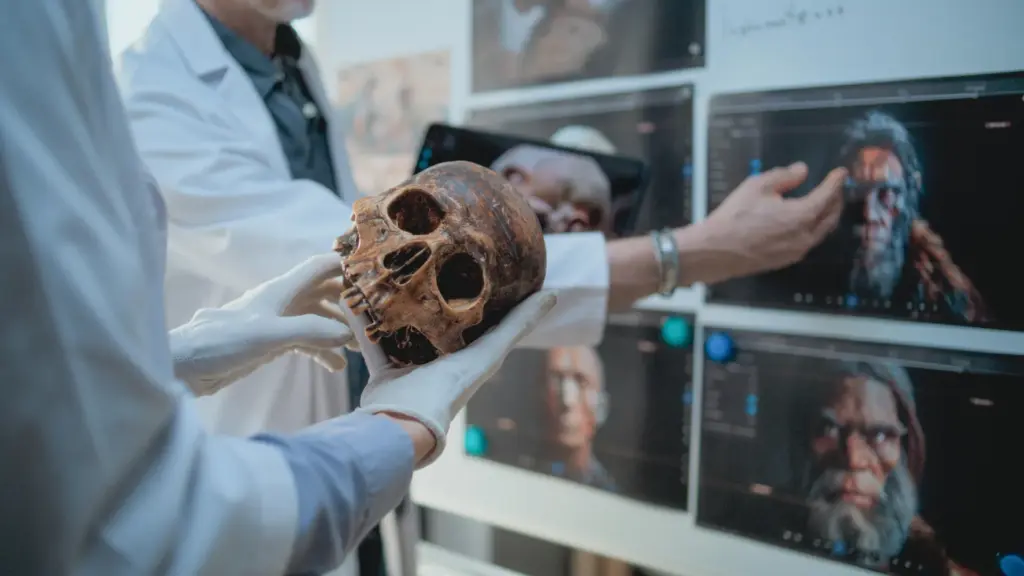
A groundbreaking study has unveiled that ancient interbreeding with archaic human species, specifically Denisovans, may have endowed modern humans with genetic variations that facilitated their adaptation to new environments. This revelation, published in the journal Science, highlights the role of a gene known as MUC19, which is crucial in forming saliva and mucosal barriers in respiratory and digestive tracts.
The study reveals that a variant of the MUC19 gene, inherited from Denisovans, is prevalent in modern Latin Americans with Indigenous American ancestry. This genetic marker was also identified in DNA samples from individuals excavated at archaeological sites across North and South America. The frequency of this gene variant in contemporary human populations suggests it underwent significant natural selection, indicating it conferred a survival advantage, potentially aiding in pathogen defense as humans migrated into the Americas thousands of years ago.
Denisovans and Their Genetic Legacy
Denisovans, an enigmatic group of archaic humans, lived in Asia between 300,000 and 30,000 years ago. The scant fossil record, including remains from Denisova Cave in Siberia and jawbones found in Tibet and Taiwan, has provided limited insights into their existence. However, a finger fossil from Siberia yielded ancient DNA, allowing scientists to trace genetic links between Denisovans and modern humans.
Previous research led by Emilia Huerta-Sánchez, a professor at Brown University, identified that a Denisovan-derived gene, EPAS1, may have enabled Sherpas and other Tibetans to thrive at high altitudes. In this study, Huerta-Sánchez and her team compared Denisovan DNA with modern genomes from the 1,000 Genomes Project, discovering that the MUC19 gene variant is common in Latino populations with Indigenous American ancestry.
Implications of Genetic Interbreeding
The study’s findings underscore the significance of ancient interbreeding in introducing beneficial genetic variations into the human lineage. According to Huerta-Sánchez, “Typically, genetic novelty is generated through a very slow process. But these interbreeding events were a sudden way to introduce a lot of new variation.”
This genetic exchange likely provided a “new reservoir of genetic variation” that assisted modern humans as they settled in the Americas, potentially enhancing their immune systems. “Something about this gene was clearly useful for these populations — and maybe still is or will be in the future,” Huerta-Sánchez remarked.
Research Methodology and Findings
The research team employed several independent statistical tests to demonstrate that the Denisovan-derived MUC19 gene variant rose to high frequencies in ancient Indigenous American populations and present-day individuals of Indigenous descent. The gene’s presence on a lengthy stretch of archaic DNA suggests natural selection played a role in its prevalence.
Moreover, the study revealed that the gene was likely transmitted through interbreeding from Denisovans to Neanderthals, who then interbred with modern humans. This genetic handoff highlights the complex web of interactions among ancient human species and their impact on modern genetic makeup.
Future Research and Biological Implications
The discovery of the MUC19 gene’s significance opens avenues for further research into its function and potential applications. Huerta-Sánchez expressed hope that recognizing the gene’s importance will spur investigations into its biological mechanisms, especially since it involves coding genetic variants that alter protein sequences.
The research was supported by various institutions, including The Leakey Foundation, the National Institutes of Health, the Alfred P. Sloan Foundation, and the Human Frontier Science Program, among others.
As scientists continue to explore the genetic legacy of ancient human interbreeding, the findings from this study illuminate the intricate tapestry of human evolution and the enduring impact of our archaic ancestors on contemporary populations.





